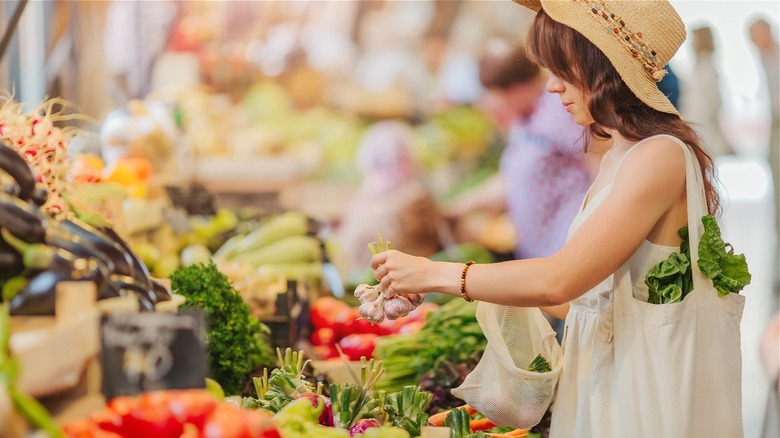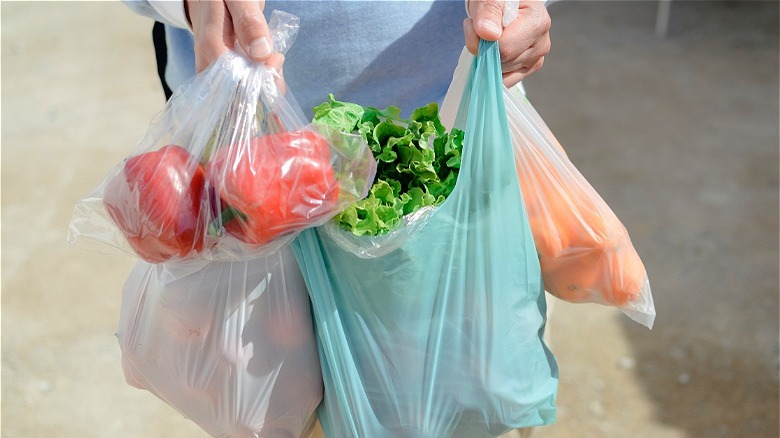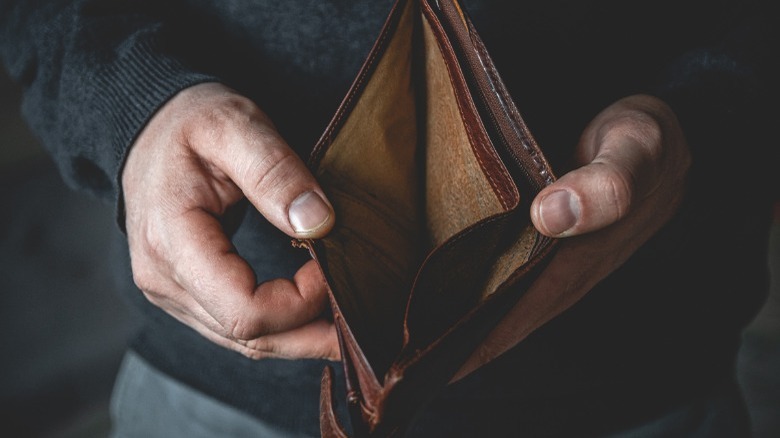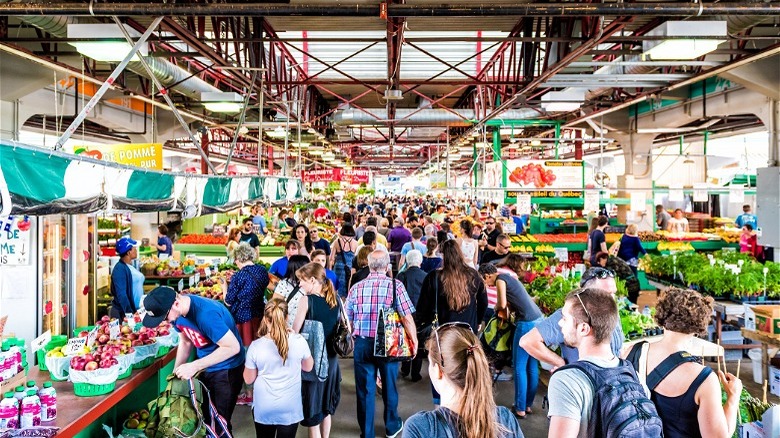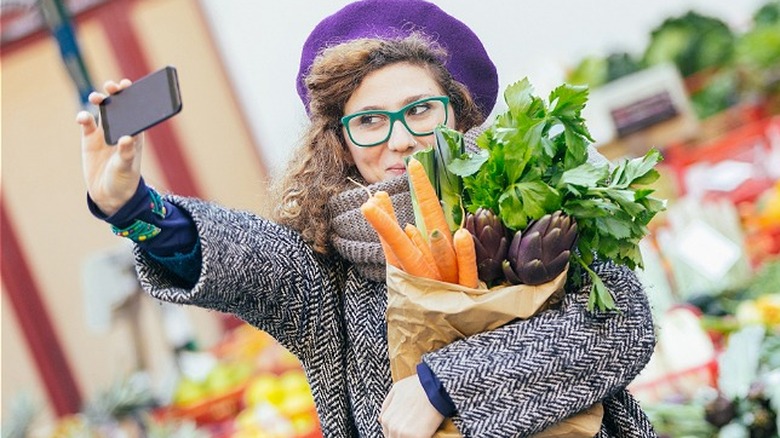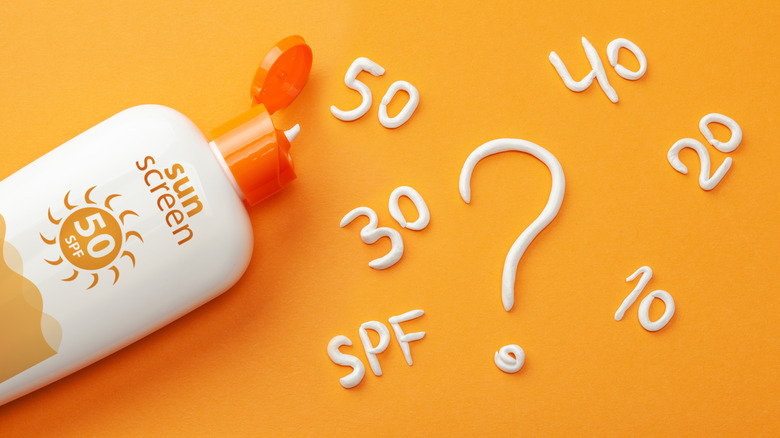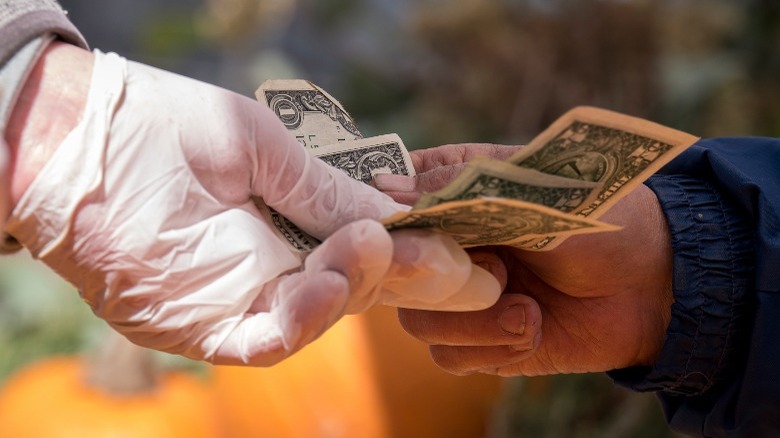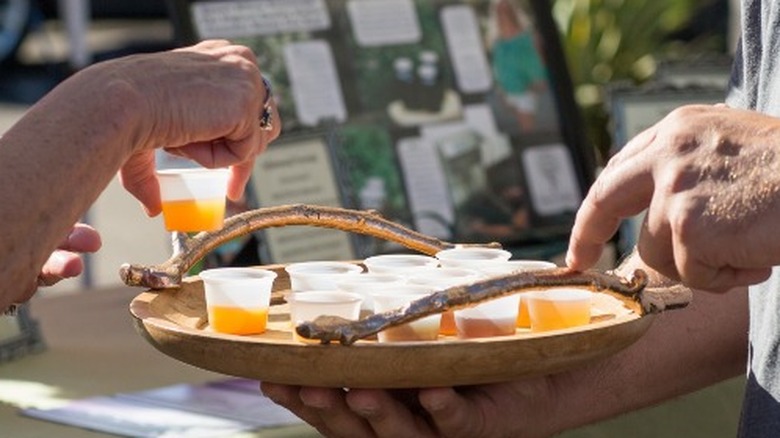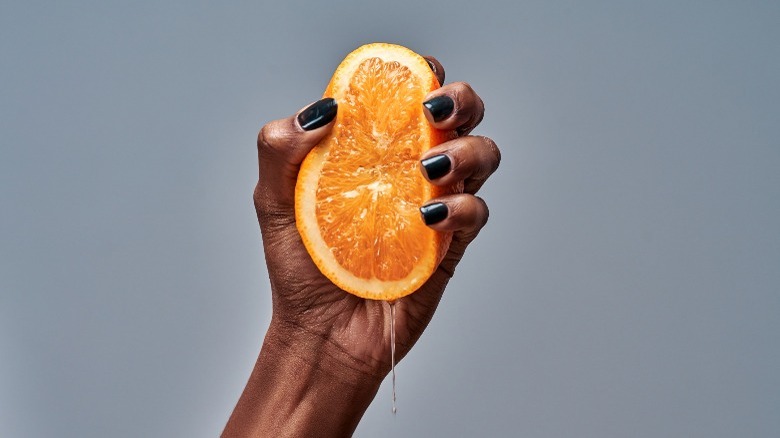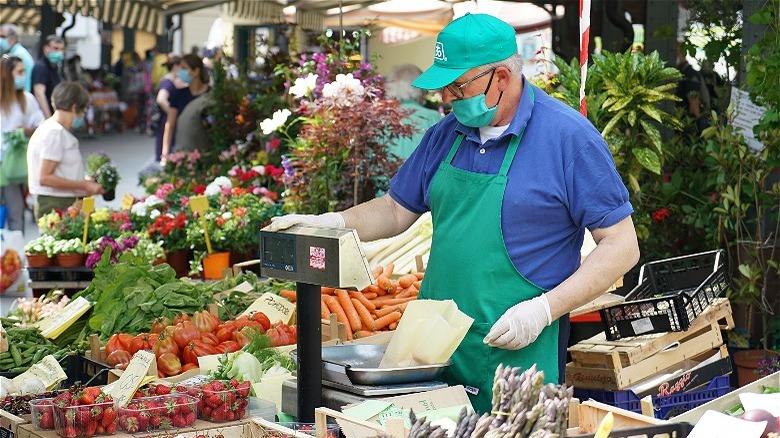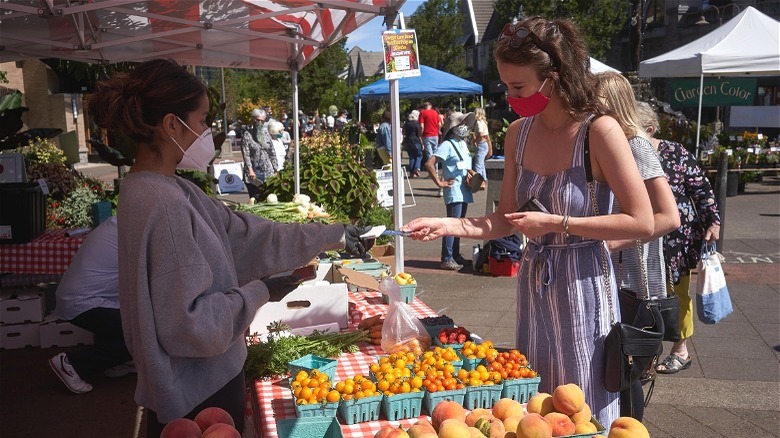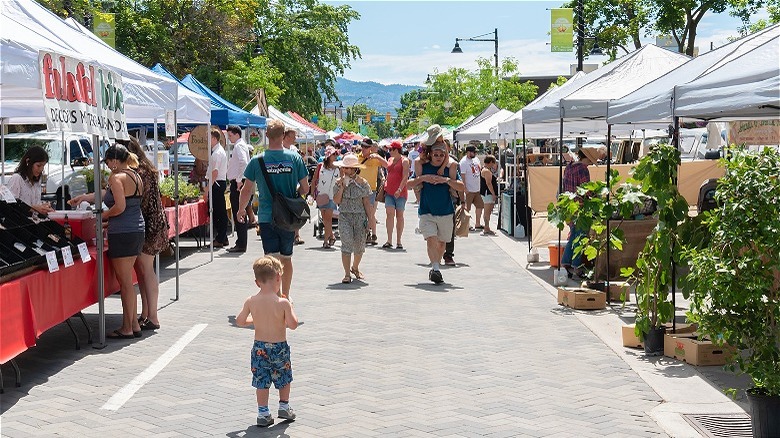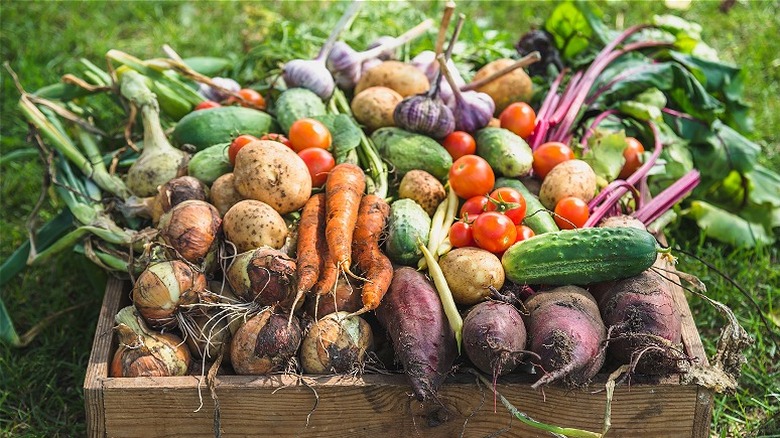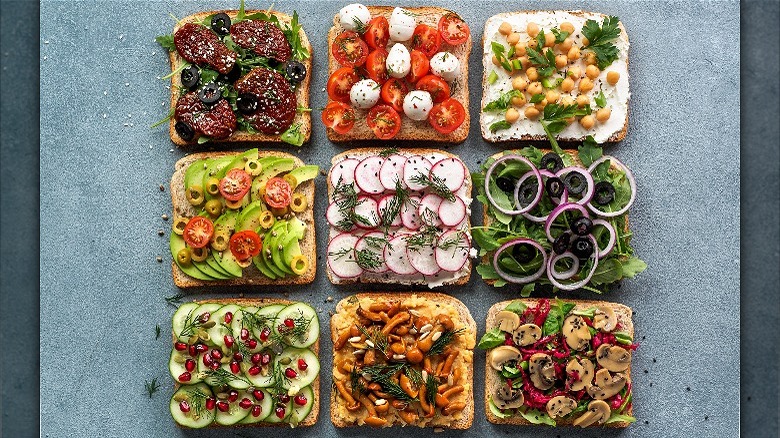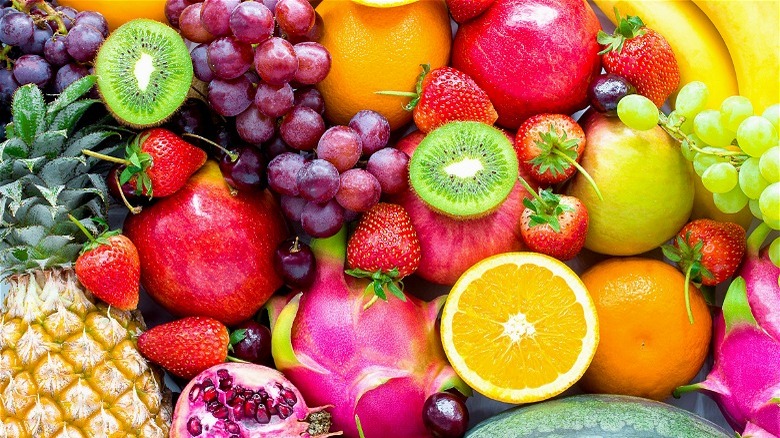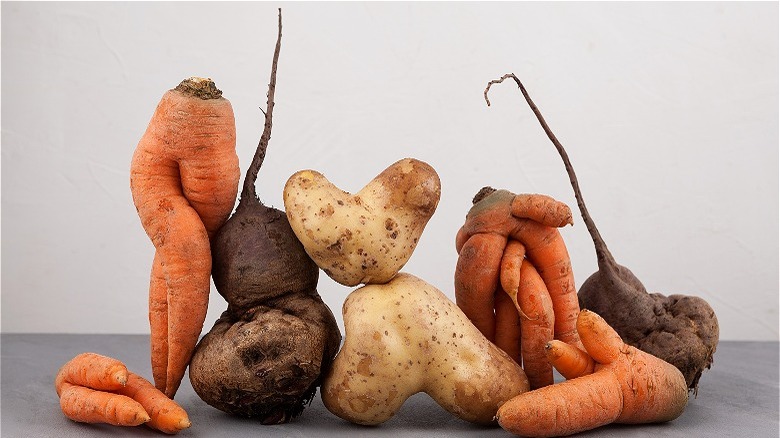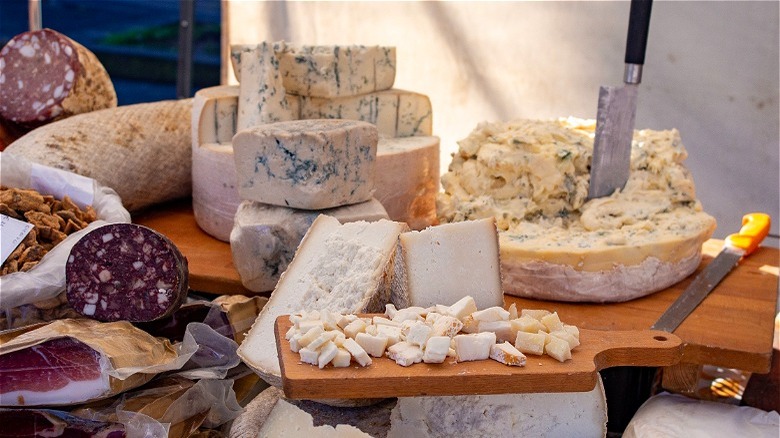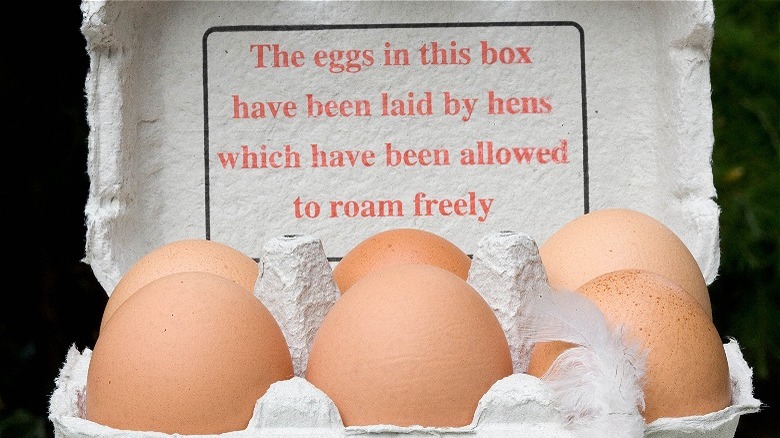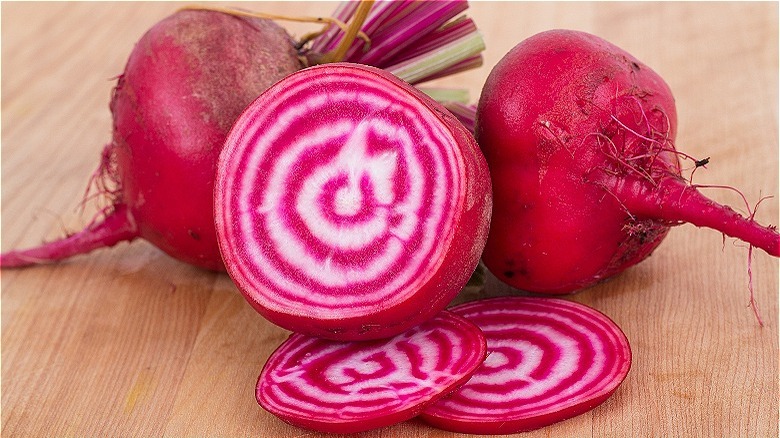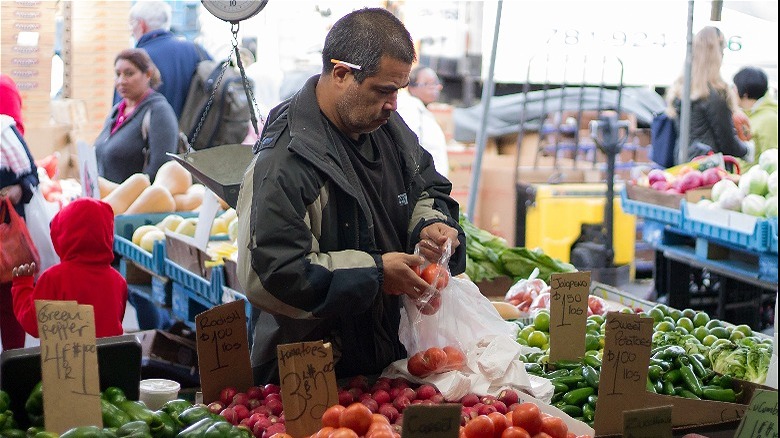Mistakes You're Making At Your Local Farmers Market
Going to the farmers market is something that we look forward to each time spring rolls around. That's when farmers markets are open again (longer and more frequently), thanks to better weather conditions. Additionally, the return of spring means more fruits and vegetables come into season. Aside from a sunny weekend outing, there are plenty of reasons to get excited about shopping at the farmers market again. Accessing fresh produce, buying meat from sustainable butchers, sampling artisanal cheeses, drinking organic coffee, sipping a bottle of sparkling kombucha, and supporting local farmers are just a few of the reasons to get excited.
However, there are also plenty of circumstances where something could go wrong at your favorite farmers market. Common blunders include not bringing the proper bags, forgetting accepted forms of payment, and lacking general food knowledge. By educating yourself and coming prepared, all of this can be avoided during your next weekend shopping trip.
These errors are nothing to be ashamed about. We understand that the farmers market is not as familiar as the grocery store. There's going to be more of a learning curve. You may not even know that you're messing up or how the experience could be improved for you — not to mention the people you're buying from. Read on to make the best of your produce shopping this summer and avoid mistakes you're making at your local farmers market.
You arrive too late, or not late enough
Visit the farmers market at peak hours and it could spell disaster. Lines for vendors are long, walkways are crowded, and offerings are picked-over. It can be tempting to head to your local farmers market whenever, but the best times to arrive are either first thing or at closing time.
"The early bird gets the worm," is applicable advice for the farmer's market. There are advantages to being one of the first people there. You get your pick of anything at the produce stalls, and popular items haven't sold out yet. The baked goods and loaves of bread are fresher, and there are fewer people with strollers, dogs, or small children to maneuver around. It can be challenging to wake up early on the weekends, but if you can muster up the motivation, getting to the farmers market early will ensure success. Luckily, you may still get to sleep in a little (compared to your workweek wake-up time). For an example of one city's hours, most farmers markets in the New York City area open at 8 a.m. (via NYC.gov).
A good backup option is getting there just before closing. If you choose this, some items may be marked down by vendors (via Rooted). Also, there may be fewer people at the market. Unfortunately, some items may be sold out and there aren't as many advantages for getting there last, but it's still better than the middle of the day.
You don't bring bags, or the right kind
If you don't bring a bag to the farmers market, it can be worse than forgetting a bag for the grocery store. There may not be a backup bag waiting for you. You could end up with food in your purse. Even more disastrous yet, those items could use a wash, filling your pasta-inspired handbag with your produce soil. Avoid these mishaps by bringing your own bags.
Forbes has a list of farmers market bags they recommend for the occasion. Most are medium to large-sized, similar to that of a beach tote. This size allows you to fit a few different heads of lettuce or cartons of unpasteurized milk in there (without the bag breaking). In addition to size, check for material. Woven bags with thick fabrics, like straw, are strong enough to hold even the heaviest vegetables.
Larger, reusable tote bags are another good option. Many brands, such as several in this list from The Spruce, sell collapsible totes. These bags can easily be stuffed into whatever you're using to carry your wallet and keys, then expanded to hold your farmers market loot. Reusable totes like these are typically waterproof and sometimes made from recycled materials — like those from the brand Baggu. Not only will you be able to carry everything from the farmers market, but you can feel even better about using those bags. They are better for the environment than using plastic produce bags in multiple ways.
You forget to bring cash
Forgetting to bring cash is a rookie mistake. At the same time, it's one of those things we all fall victim to every once in a while. However, if you do this at the farmers market, you might not be able to get anything. Not all vendors accept credit, debit, Venmo, or other forms of electronic payment. However, most farmers are likely to take cash (via Maine Farmers Market).
How much cash to bring depends on the shopper, but there are a few ways to predict how much you will need. Most people won't spend as much as they would during a normal grocery trip. However, comparing farmers markets to your grocery store won't always come out the same way. Sometimes, the stuff at the farmers market is cheaper. Other times, production costs and the smaller scale of growth that happens on local, organic farms, force vendors to charge more (via LinkedIn).
No matter how much cash you bring to the market, you can ensure success by bringing certain bills and coins. Bring ones and fives to help pay for smaller items. Bring small change to be able to pay the exact amount. This is not only convenient for some vendors, but necessary. Even as recently as January 2022, the COVID-19 pandemic has limited the number of coins available across the country (via New York Magazine).
You block the flow of people
Farmers markets can get crowded. Go to one on the weekends and it could be impossible to get around. Go to a weekend market during peak hours and you might leave without getting anything you wanted because it's so busy. Sometimes, though, the time of day that you're at the market isn't the problem — it's you. People can get stuck in the flow of a farmers market and make the experience terrible for everyone else.
To avoid dirty looks and shoulder-checks, you should be mindful of the space around you. One Tripadvisor reviewer described the problem of lack of self-awareness while shopping, saying, "The patrons are generally insufferable. Lots of group shopping in small spaces, too many giant strollers and tons of looky-loos." This person wasn't the only one experiencing a crowd problem at their market. A Reddit user also commented, "I can't stand how crowded farmers' markets are. I know I should like them, but the whole experience is too stressful."
We can all do our part to reduce crowd problems at farmers markets. Leave the big strollers at home. Better yet, don't bring your kids (if possible). Be mindful of how long you're standing in front of a stall. Are you going to buy something? If not, keep moving. All of this will help keep the flow of people moving at your next farmers market.
You stop to take pictures for social media
There is another major reason traffic jams of people occur at farmers markets: phones. People get excited about the sun shining on their fresh bunch of kale and things go awry. Don't be one of these people stopping to open up Instagram to take Insta-ready food photos in the middle of the market.
As GQ explains, it's hard to resist snapping pictures of the colorful stacks of produce you see. You don't mean to brag, but simply to admire the artistic nature of the food. However, it doesn't always come across that way. To some people, these farmers market pictures (like pretty much anything else you could post online) come across as seeking validation. Nobody is going to give you an award for waking up at 10 a.m. on a Sunday and going grocery shopping. It even appeared that way to the late celebrity chef Anthony Bourdain, who once said of Instagram food pics, "It's about making other people feel bad about what they're eating. And a certain knowledge that what you're eating is more interesting" (via Smithsonian Magazine).
Now, this could seem harsh. Some of your followers could enjoy this content. You don't have to be discouraged from taking pictures altogether. Just don't let it distract from the actual purpose of going to the farmers market: buying food. Whatever you do, don't let your picture-taking put other people's shopping experiences on hold. Be mindful of where you pause to take photos.
You forget to wear sunscreen
Not preparing for the weather is a terrible error to make at the farmers market. Most markets operate during the warm seasons, but that doesn't mean the occasional cold front can't come through (and make you wish you dressed warmer for that particular shopping trip). However, most meteorological problems experienced at the market are related to spring and summer temperatures. Forgetting sunscreen is a common error that happens this time of year.
As the Santa Monica Farmers Market explains, "Spending the day at a Santa Monica farmers market can be a great time. Nursing a sunburn for the next few days is not." Put on sunscreen before you go, and maybe even wear a hat (all the trendy people at the farmers market seem to be doing that already). Additionally, it's a good idea to bring sunscreen with you. Prevention recommends reapplying sunscreen every two hours, and reapply more often if you're sweating a lot. During those springtime trips to the farmers market, be especially cautious. As The Weather Channel says, sometimes, people forget to lather up their SPF during these months, to their detriment. That's because the sun is shining without a huge increase in temperature.
Protecting yourself from the sun is by no means the only way to prepare for farmers market weather conditions. You should also check the weather for rain and bring an umbrella if needed. If things look especially hot, make sure you've packed water to stay hydrated while shopping.
You bring your dog
Dogs at farmers markets are controversial. There are the people who don't want them there, like this Reddit user who explained, "I don't love dogs at the Farmer's Markets mostly because there are already enough distracted people milling about." Adding dogs on leases to the environment makes things more chaotic, the person said. On the other hand, some people are upset when dogs aren't allowed. "Dogs banned at Farmers' Market," one Reddit poster said, "Just found out about this today, made me angry, then sad."
In the United States, there isn't a federal law banning all animals from outdoor food markets. Some places, like California, do have a statewide ban against bringing your dog. According to ABC10, it's a health code violation to do so. There are some exceptions, such as with law enforcement animals. But overall, leave your pet at home if you're going to a California market.
Bring your pet to a farmers market outside of this one state, and it will probably be allowed. Even if it's legal, however, some patrons and vendors may not appreciate it. As the Chicago Tribune explains, people are not only worried about excited dogs making their way through the crowd — barking and possibly getting distracted by other dogs — but getting a little too close to food products. All tension can be avoided by not bringing your dog the next time you head to the farmers market.
You haggle
Haggling is sometimes a great idea for flea markets or yard sales. You can negotiate prices there, by all means. Maybe those products are used or a kind of burden to the seller. On the other hand, vendors at the farmers market don't usually have the same mindset. You shouldn't always try to haggle at the farmers market.
Markets don't typically have rules about this, but it can be frowned upon. One online user explained how it comes across poorly. "It just seems disrespectful to me. Negotiating for a new car? Yeah. For an ear of corn? No," the person wrote on EG Forums. You wouldn't haggle for prices at a grocery store, so don't do it at the farmers market. The vendor put labor into growing that food and bringing it to you for sale. Your shopping process is likely to be more peaceful if you avoid negotiating food prices with stall operators.
There can be some instances where haggling may go over more smoothly, and the end of the day is one of them. Prices may be more flexible as vendors may be trying to clear out their stock before the day is done (via The Grocery Store Guy). However, it's still considered more polite to simply wait for farmers to lower their prices (of their own accord) rather than eagerly suggesting your own.
You take too many free samples
Sampling at the farmers market is acceptable. Vendors are usually excited to share a little bit of free stuff with patrons. Plus, with the COVID-19 pandemic more under control in the U.S., samples are usually available at grocery stores like Costco and Trader Joe's. We aren't afraid to share food anymore, but still, vendors don't want to give too much away. You should sample in moderation at the farmers market.
Feel free to take as many samples as you want, but do not take them all from the same stall. Vendors offer tastings of products with the hope that someone will try them and buy something (not ask for another sample). If you like how something tastes and want more — buy it! If the product is on the expensive side, buy a small amount of it. You will probably be happy that you did.
Also, as Modern Farmer explains, you should ask first. Before taking something off a vendor's table and putting it in your mouth, ask. If the stall operator is offering it to you, go ahead. If not, just say something before taking the sample. After saying thank you, your work is pretty much done. You don't have to stand there and say you love the item if you don't like it. On the other hand — if you hate how something tastes — maybe keep that to yourself as well.
You don't handle the fruit properly
Vendors take caution when handing out free samples. They are required to follow certain health and safety codes to prevent the spread of disease, and stall operators wash their hands. Similarly, you should exercise caution while handling farmers market produce.
For the sake of the vendors, you should approach the touchable products with caution. At stalls, try to handle what's on the table with care. Do not haphazardly pick up food that a vendor is trying to sell. Don't bruise the produce by dropping it or grabbing it too roughly.
For the sake of other patrons, you should try to remain as clean as possible throughout the day. Many people will go through the market and come in contact with the same foods. As such, you should be washing or sanitizing your hands between stalls. This can prevent food contamination that could create illness or allergic reactions.
For the sake of yourself, you should practice food safety around fruits and vegetables. Although they may seem more harmless than raw chicken, produce can also carry disease. Per the Centers for Disease Control and Prevention, some of the most common produce-borne illnesses include E. coli, Listeria, and Salmonella. You can avoid getting these by steering clear of bruised or damaged items, washing your hands and your produce, and separating fruits and veggies from raw animal products.
You don't follow safety rules requested by the market
Dogs aren't the only things at farmers markets that have rules. Certain markets can also have measures to protect against the spread of COVID-19. Those, like masks and vaccination card checks, can vary from place to place. You may want to check what is required before going, or upon entering, a farmers market. Signs about these rules may be posted near the entrance.
Since farmers markets typically happen outdoors, rules governing coronavirus could be laxer than at some restaurants. For example, the Hollywood Farmers Market doesn't require masks at all times, but only in places where at least six feet of distance between individuals cannot be maintained. Additionally, the market noted that "Some vendors may require masks to be worn while shopping at their particular booth."
These rules now are much more easygoing than the restrictions required of patrons at the beginning of the coronavirus pandemic. Then, farmers markets took an extreme sales hit due to closures (via National Library of Medicine). It's best to try to follow coronavirus restrictions at the market now, for the ease of vendors and other patrons.
You don't make friends with vendors
Your whole experience at the farmers market can be blighted by a negative interaction with a vendor. Offending stall owners can be avoided with the aforementioned advice (leaving your dog at home, not taking too many free samples, following coronavirus safety measures) but also in other ways. If you can get a vendor to like you, the whole day of shopping can be improved.
There are plenty of ways to get to know a farmers market vendor, and consistency can help. One Reddit user said of their own experience, "The more often you go the more comfortable you feel to just chat with them. I usually go to the same vendor and the familiarity helps." At the bare minimum, if you greet them with a smile and mind your manners, you're likely not going to make anyone mad.
To bond with a stall operator, it's good to ask them questions. How old is your farm? How long has it been there? How should I cook this product? The farmers market is also a unique opportunity to find out more about how your food was grown. Were there pesticides used on this item? When was it harvested? What's in season right now? All of this could potentially bring you and your vendor closer together. In turn, you could get better deals, more personal cooking advice, and even specialized recommendations in the future.
You only visit a few stalls
One of the biggest pitfalls of the farmers market is limiting yourself. You spend too much time at one stall, or you get tired after eating all the free samples. You end up only buying produce from two different vendors. At the end of the day, you are walking out of the market, wistfully looking at all the other farmers you wish you bought stuff from.
The way to avoid this is by taking a lap. By first walking around the entire perimeter of the market, you can see all the places available. You can see what catches your eye and what does not. Then, you can head to the vendors which seem the most interesting to you.
Also, don't spend more time at a particular booth than you want. If you've already sampled something and don't like it — time to leave. Simply tell the vendor thank you and move on. If you like it, quickly purchase the item and go to other vendors. If buying from the farmers market is an investment in your local economy (via Lakonia Imports), then buying from as many vendors as possible is an even bigger boost to the local food movement in your area.
You don't know what produce is in season
Farmers market produce is known for being organic and fresh. That probably means it's freshly harvested, whenever you may go. However, knowing ahead of time which products are in season can ensure the utmost success during your shopping trip. In-season fruits and vegetables are good for your local economy and taste better than out-of-season produce.
The U.S. Department of Agriculture (USDA) has a guide explaining what produce is associated with each season. Spring is known for foods like asparagus, carrots, and fennel. Summer is associated with vegetables like tomatoes and green beans. Popular summer fruits include blackberries, raspberries, peaches, and plums. Foods that are ideal in fall include apples, pears, pumpkin, and squash. Winter produce is more scarce, but you can still find good citrus fruits like lemons, limes, grapefruit, and oranges during this time of year. These are only a few examples of what is going to look best at the farmers market, depending on what time of year you go grocery shopping there.
What's in season changes depending on what region, or even state, you are located in, per St. Joe's Farm. However, some websites like Seasonal Food Guide will help you search what produce is in season in any U.S. state during any month of the year.
You neglect to plan meals ahead of time
A mistake we often make at the farmers market is buying too much. We might get so much produce that we couldn't possibly cook it all before some of it begins to go bad. Other times, we may end up with fruits or vegetables we are unfamiliar with. This leaves us guessing what to make with our farmers market haul leftovers. To avoid this problem, you should plan what meals you'd like to make ahead of time.
That doesn't mean you have to put creativity on hold. There are plenty of plant-based recipes to inspire your trips to the farmers market. Salads are an obvious way to start. These dishes utilize kale, arugula, or other lettuces. Vegetable sandwiches are also good. Put those tomatoes, peppers, or mushrooms in there. There's also soup — gazpachos are a good choice for those warm farmers market months. Vegetarian quesadillas, tacos, enchiladas, and more are just a few more inventive farmers market recipes to try. They also are great for making big batches, so you could even host a dinner party to get rid of the rest of your produce.
For an additional hack, take note of which fruits and vegetables last the longest. That way, if you can't use something immediately, you'll have time to use it before it begins to rot. Fruits with impressive longevity include apples, limes, and oranges. Likewise, vegetables with staying power include cabbage, carrots, beets, sweet potato, and cauliflower.
You don't know how to identify ripe fruit
Identifying ripe fruit is another issue that people have. If you don't know when an avocado is ready to eat, you could eat up cutting it into either a mushy mess or a stringy rock — both are not preferable to eat. Learning what ripe fruits look like can help you pick out fresh produce at the farmers market.
According to WebMD, ripe apples should be firm, without any soft spots. Pineapples should be slightly firm and smell sweet. Raspberries, blueberries, and blackberries should look plump and not be leaking any juice. Mangos and bananas should be left to ripen on the counter. When either fruit is a bit soft, that's when they're getting ready to eat. Oranges should be shiny and the skin should appear thin. Leave them in the refrigerator until they feel heavy for their size, then they are ripe (via Market Basket Foods).
In addition to the aforementioned ways to identify ripe fruit, the best produce has a deep color and lacks bruises, as this indicates freshness. Of course, you don't always want to buy fruit when it's already ripe. There may be some items you want to eat in a few days. Just plan ahead so you don't end up wasting food.
You only buy picture-perfect produce
The ugly produce movement is controversial. Some people think it takes food — that otherwise would go to CSAs and food banks — and resells it for a profit (via The Counter). Other opponents think the issue of food waste has always been with the customer, not farmers (via The Washington Post). However, you can contribute to ending food waste while shopping at the farmers market. Don't be afraid to buy uglier fruits and vegetables than would normally end up in your reusable tote bag.
There are a few ways to tell if a food is simply "ugly" or inedible. You don't have to force yourself to eat a bruised piece of fruit. However, bruises do not always indicate that a food has gone bad (via DBS). For example, bruised bananas can mean ripeness, but bruised apples can mean they've passed their expiration date. Telling the difference requires learning a little bit about each piece of produce out there. However, there's an even easier way to buy ugly foods at the farmers market.
Unattractive foods that are most likely safe to eat are those lumpy-looking lemons, those carrots which have split at the bottom, oranges that have opened up at one end, or pears that look like they are slumped over in a chair (via Waste 4 Change). In most cases, if the skin of these fruits and vegetables is still glowing and deeply vibrant in color, you can eat them.
You only buy produce
Produce isn't the only thing to get at the farmers market. You typically come across several stalls devoted to cured meats, bread, aged cheeses, honey, and jam. There are even non-food products to choose from, such as soaps, candles, and other beauty products. You're missing out if you leave the farmers market with only fruits and vegetables.
With those non-produce items, you can expect to pay a little more than you would for your pre-grated tub of parmesan from the grocery store. However, these specialty booths at the farmers market are worth the extra money. They are often made on a smaller scale, which can sometimes mean better quality, a more complex taste or smell, and a lack of artificial ingredients. You'll pay more at the farmers market for a few ounces of cheese, but it might be worth it.
"We buy olive oil from a local producer, butter from a cheesemaker, mushrooms, pork, honey, fruit, bread, chard, and lettuces," as one Reddit user said of their typical farmers market haul — notably including non-produce items in their list. "I love the homemade – usually goat-milk – soaps I can get at my local market. They smell better, last longer, and are just generally better than commercial," another user responded, describing one of their favorite products to buy at the farmers market. Getting your soap at the market is another way to spice up your shopping trip, all while supporting small businesses selling there.
You assume everything is organic
You may think of the farmers market as a place with fresh, organic food. However, assuming that every item you come across is non-GMO, cage-free, pesticide-free, or free-range is a mistake. Like the grocery store, not everything you find at the farmers market is organic. However, thinking that you have to stick to organic products can also be limiting.
As an expert explained to Food Insight, "Many farmers who sell at farmers markets say they use organic methods. Some farmers who sell at farmers markets say they use conventional methods...Buying organic is an option and a personal decision. Is it the only way to have safe food? No."
According to the USDA, "organic foods are grown and processed according to federal guidelines addressing, among many factors, soil quality, animal raising practices, pest and weed control, and use of additives." Of course, some foods are safe to eat that are not USDA-certified organic. But if organic foods are what you are looking for at the farmers market, you should ask the vendor a few questions before purchasing something.
You don't try anything new
This mistake and others come from an overarching problem. People treat the farmers market like the grocery store, but by appreciating the differences between the two, we can take advantage of all that outdoor food markets have to offer. One way to do that is by stepping outside of your regular shopping list. Try something you've never had before the next time you go.
According to FoodPrint, there is a handful of rare summer fruits you should be able to get at most farmers markets. There are currants, bright (typically red) small berries that grow on a vine. There are ground cherries, those small fruits that look individually wrapped in own their parchment paper packages. Then, there are the crossbred stone fruits, such as Pluots, Plumcots, and Apriums. The farmers market is a great place to try one of these fruit hybrids.
Prevention also offered a list of rare vegetables that are common to the farmers market. Sunchokes are tan, knobby-looking roots that look like oversized ginger. These plants are eaten and cooked in methods similar to potatoes. There are Chioggia Beets, which look normal on the outside but are filled with a beautiful pink-and-red striped pattern underneath their skin. You could also try Romanesco — it looks like a pointy, light green cross between cauliflower and broccoli. Yellow and green tomatoes are also commonly found at the farmers market. All of this produce may taste a little different than you expect, but it's worth trying.
You don't take advantage of bulk deals
Going late to the farmers market is one way to get lower prices on what vendors are selling. Buying in bulk is another way to save money. If you get multiple versions or a handful of one item, the vendor may discount it for you. You can save the extra stuff and use it up over time, use it to make canned goods that will last longer, host a dinner party, or share it with friends. Missing out on these bulk deals is a big mistake.
A Tripadvisor reviewer who visited the farmers market attested to this, saying, "Some items were the same price as retail stores yet many items were dirt cheap. Especially in bulk." Southern Savers explains that sometimes, whatever bulk deal is offered to farmers market shoppers is the same one that was offered to the grocery store. It noted that you might get way more of one item than you intended (like several pounds of strawberries) but offered a way around this. "Strawberries, for example, are sold in 12 lb flats," the site noted. "During the peak season, they are $7 for a flat, that's 58¢ a lb! Think you could handle grabbing that and freezing the extras?? Yeah, I thought so!"
